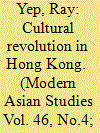| Srl | Item |
| 1 |
ID:
115053


|
|
|
|
|
| Publication |
2012.
|
| Summary/Abstract |
The rule of law has always been cherished as one of the key institutions central to the successful transformation of Hong Kong from 'a barren rock' into a global city. The colonial administration's respect for the principles of the rule of law, however, has been tested by sporadic political turbulence during the 150 years of British rule. Due process of law and other key principles of English laws have been compromised by political expediency when the colonizers felt threatened by challenges from various sources. The 1967 Riots was one of those difficult times. Despite the facade of public support for firmness against disturbances enjoyed by the colonial government, the exercise of some of these emergency powers, particularly the powers to detain and deport, remained highly controversial. With normalization of the Anglo-Chinese relationship in mind, the confrontation prisoners constituted a stumbling block for renewing the friendship with Beijing. The various attempts made by London at pressurizing the Hong Kong government for early release of these prisoners attest to the prevalence of political expediency over the respect for the rule of law under colonial rule.
|
|
|
|
|
|
|
|
|
|
|
|
|
|
|
|
| 2 |
ID:
071965


|
|
|
|
|
| Publication |
2006.
|
| Summary/Abstract |
This article challenges the increasingly prevalent idea that since September 11, 2001, we have moved into a state of permanent emergency and an abandonment of the rule of law. The article questions this idea, showing that historical developments in the twentieth century have actually placed emergency powers at the heart of the rule of law as a means of administering capitalist modernity. This suggests we need to rethink our understanding of the role of emergency measures in the "war on terror" and, more generally, to reconsider the relationship between the rule of law and violence.
|
|
|
|
|
|
|
|
|
|
|
|
|
|
|
|